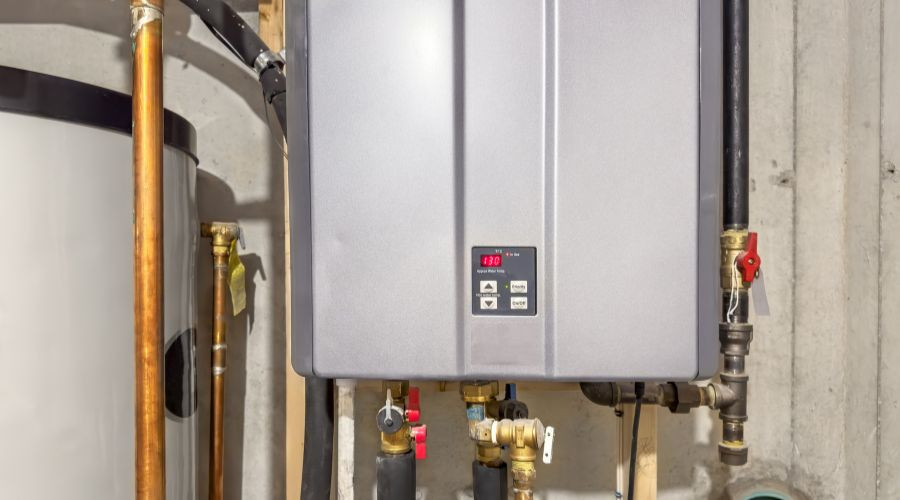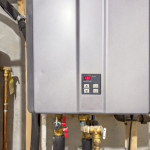Why Install a Tankless Water Heater?
Tankless water heater installation offers instant, energy-efficient comfort, and helps reduce long-term utility costs by heating water only when it's needed.. This guide provides an overview of what tankless water systems are, how they work, and the main benefits of installing them. The last section considers indicators of old water heaters needing replacement, which is useful for anyone wondering whether it's time to upgrade to a more efficient system.
What Is a Tankless Water Heater and How Does It Work?
A tankless water heater (also known as an instantaneous water heater) heats water instantly as it flows through the unit, eliminating the need for a bulky storage tank that traditional water heaters typically require. Unlike conventional systems that constantly maintain 40-80 gallons of heated water, on-demand water heaters activate only when a hot water tap is turned on, which makes them significantly more energy-efficient.
The heating process is surprisingly straightforward. When a hot water faucet is opened, cold water enters the tankless unit through an inlet pipe. A flow sensor detects the water movement and signals either a gas burner or electric heating elements to ignite or activate. The water passes through a heat exchanger where it's rapidly heated to the preset temperature and usually reaches the desired heat within seconds.
The heating cycle happens instantly. Water is heated as it flows through the small unit, instead of being pulled from a preheated hot water tank. When the tap is turned off, the heating elements stop, unlike traditional heaters that continuously warm water to maintain a temperature.
Benefits of Installing a Tankless Water Heater
 Modern homeowners are discovering that tankless water heaters offer distinct advantages over traditional storage tank water heaters. These units provide hot water instantly—no more waiting for a tank to heat up. Unlike storage water heaters, which continually reheat water throughout the day, tankless models only operate when the hot tap is turned on.
Modern homeowners are discovering that tankless water heaters offer distinct advantages over traditional storage tank water heaters. These units provide hot water instantly—no more waiting for a tank to heat up. Unlike storage water heaters, which continually reheat water throughout the day, tankless models only operate when the hot tap is turned on.
Tankless water heaters are also more energy-efficient, helping to save money on utility bills. Their compact design frees up space, as they mount directly on the wall instead of occupying floor space.
Another benefit is their long lifespan—tankless systems usually last 15–20 years, compared to the 8–12 years of traditional tanks. Lower operating costs, extra space, and reliable on-demand hot water make tankless water heater installation a smart choice for modern homeowners.
Signs It's Time to Replace an Old Water Heater
 A strong indicator that it's time for water heater replacement is fluctuating water temperature. Strange rumbling or popping noises often mean sediment has accumulated in the tank, and rusty or discolored water from faucets can be a sign of corrosion.
A strong indicator that it's time for water heater replacement is fluctuating water temperature. Strange rumbling or popping noises often mean sediment has accumulated in the tank, and rusty or discolored water from faucets can be a sign of corrosion.
Water pooling around the base is another clear indicator of a leak that will only get worse. Ignoring these issues can lead to more significant problems and costly water damage to homes.
Age is also important to consider—most traditional tank water heaters last about 8–12 years with proper care. An unexplained rise in energy bills might be a sign of an ageing water heater, and if frequent repairs cost half as much as a new unit, it often makes more sense to replace it. When it's time for a new water heater, it's worth considering a tankless system. Tankless water heaters provide endless hot water, save space, and are much more energy efficient, which can lower monthly bills.
About Green Hills Plumbing
Green Hills Plumbing is a reliable plumbing company serving Nashville and the surrounding areas. With upfront pricing, expert technicians, and 24/7 emergency service, customer satisfaction is guaranteed! Call them today for tankless water heaters in Nashville, TN.



